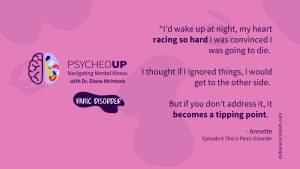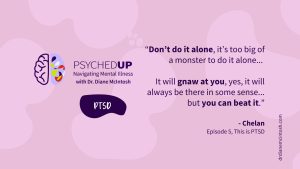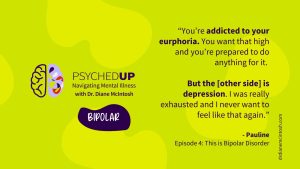Over 25 years of psychiatric practice, I’ve rarely been at a loss for words. Freud’s blank screen, the metaphorical backdrop onto which a patient should project their feelings and fantasies during therapy, was never something I subscribed to. Arguably, it’s not possible for a therapist to be a completely blank screen. And, it’s literally impossible for me to hide my feelings.
The job of a psychiatrist is defined by each clinician, which isn’t necessarily the best way for any profession to be practiced. However, due to our lack of objective tests, such as imaging or laboratory markers, decisions about psychiatric diagnosis and treatment are often based purely on clinical experience. We have clinical scales, which help to validate a diagnosis, but they’re not always (or commonly) used. Of course, if you have the wrong diagnosis, the treatment that follows is unlikely to be optimal. Basing treatment decisions on comfort or habit can result in choices that are not tailored to a specific patient’s unique needs. This practice runs counter to the imperative of personalized medicine: finding the right treatment for the right person at the right time.
My job description for my role as a psychiatrist looks like this: First and foremost, I am a guide. My patient is the captain of the ship – after all, it’s their body, their brain. I am the navigator, working with them to determine what diagnosis best explains their symptoms. THEN we formulate a treatment plan that best fits their needs. My job is to use the best and most up-to-date science, together with my clinical experience, to help my patient navigate what are often rough seas. After all, it can be scary to learn about a diagnosis. It’s also challenging to understand and accept that finding the best treatment is a process of trial and error.
My second job is to educate, because an educated patient is more engaged in their care. That means they’re a real partner in the process and they have a sense of control, even if they’re feeling out of control in other aspects of their lives. Critically, they’re also more likely to adhere to our plans and maintain hope, despite the challenging process of finding the best possible treatment. In short, educated patients are more likely to get well and stay well.
Education has always been something I enjoyed – I had better, since I spent 14 years in post-secondary education, with undergrad, medical school and residency. Unsurprisingly, my pharmacy degree was an incredible asset in medical school. In my psychiatry residency, I learned that one of the most important tools of our trade is the ability to prescribe medications appropriately. While many psychiatrists pride themselves on their psychotherapeutic acumen, what truly differentiates us from our psychologist and counselor colleagues is our ability to prescribe.
Unfortunately, safe and effective prescribing in psychiatry, called psychopharmacology, is not well taught, and it’s not, in my opinion, given the priority it should have in residency training, whether in psychiatry or family practice. So, throughout my career, I’ve leaned on my advanced psychopharmacology training to deliver continuing medical education (CME) to my peers, especially regarding safe and effective prescribing.
It will surprise many to know that some of the highest quality CME is provided by pharma companies. While negative opinions regarding “big pharma” were once well founded, there has been a major shift over the last 15 years. The quality and integrity of pharma-provided CME came under such intense scrutiny that had everyone’s behaviour not changed (companies and doctors), the economic and health impacts would have been staggering. This is because Canada benefits enormously from a healthy pharma industry- they’re excellent employers and they make a significant (> $2B annually) contribution to our economy. More importantly, pharmaceutical companies develop and provide access to treatment innovations, such as HBV and COVID vaccines, gene cancer therapies, and biological treatments for inflammatory disorders. The loss of trust in the pharmaceutical industry could prevent our access to innovative treatments, which would further burden our faltering healthcare system. A loss of trust in the integrity of clinicians would destroy it completely.
After a very difficult experience with burnout, I decided to look for new ways to support psychiatric care for patients. I knew that improving mental healthcare in this country wasn’t just about producing more psychiatrists and shortening wait times. Family practitioners are the front door into the mental healthcare system- they carry the greatest weight of mental healthcare delivery. I decided to focus on helping my family practice colleagues become more confident, rational prescribers, so they could better support their patients and improve outcomes.
It’s a challenge for anyone in healthcare to stay up to date on the latest evidence and newest treatments. Those who don’t attend pharma-sponsored events are less likely to learn about newer treatments, which might enhance their patients’ experience. While there are more than twenty medications approved by Health Canada to treat depression, they don’t work for every patient. Additionally, an effective treatment might cause side effects that make it very difficult to take. Side effects are one of the most common reasons for treatment discontinuation. Newer treatments often focus on enhancing tolerability, which supports treatment adherence.
Seeing a gap, I started PsychedUp CME, a program specifically focused on sharing the latest science underlying psychiatric diagnoses, as well as sharing validated tools to heighten diagnostic accuracy and clinical tips to help clinicians make the best possible treatment choices, personalized for their patient’s needs. There was no pharma industry involvement in the development of the PsychedUp programs and every drug, whether brand new or one that had been around for 50 years, was included. I had a variety of clinicians validate the programs, to ensure they were balanced, credible and brought value.
While we started with day-long, in-person events in large venues across Canada, the pandemic caused us to quickly pivot to virtual events that still provided the opportunity to ask questions. We soon learned that having an “ask me anything” approach meant that at every break I’d have a line up of 30 colleagues waiting to ask a question! So, we adjusted our virtual programs to encourage attendees to ask questions throughout the presentation. Using Slido, an audience interaction tool, attendees could “vote up” a question, ensuring it was answered in one of the two question sessions. It wasn’t uncommon to have several hundred questions over the course of a session.
We learned a great deal from the more than 5500 people who attended the 42 live and virtual events I delivered, not to mention the recorded programs that people could download and watch on their own time. First of all, while the programs were developed with family doctors in mind, nearly half of the doctors who attended have been psychiatrists. Some of the most engaged attendees, at least in terms of asking questions, have been the nurse practitioners, who are increasingly leading busy family practices. We have also had many pharmacist attendees, who can prescribe in some areas of Canada, as well as the occasional, but most welcome, psychologists, clinical counselors and social workers.
The range of topics have covered the spectrum of psychiatry, including depression, bipolar, schizophrenia and ADHD, but also topics like psychedelics, cannabis, inflammation and the gut microbiome. For the mainstream topics, some colleagues have attended the same session multiple times. As part of accreditation, which allows us to offer professional credits, participants must provide feedback in order to receive a certificate of attendance. The feedback has been invaluable in improving the programs, developing new content and keeping my spirits high!
The most common feedback we received was that PsychedUp programs are highly practical. Attendees share that they can utilize the new information in their practice immediately.
What struck me most from this experience is that there is a seemingly bottomless appetite for education around psychopharmacology. Likewise, clinicians are not immune to news stories, social media and other streams of information. Despite mountains of evidence, some disorders continue to be controversial, like ADHD. Clinicians are also eager to understand more about what their patients are asking about – cannabis and psychedelics are hot topics. I’ve been encouraged by the engagement in the sessions and also knowing that my shift to supporting my colleagues is having an impact on their confidence and care.
Clearly, I’ve always been psyched up about education, or I wouldn’t have spent half my life in school. PsychedUpCME has given me a venue to help thousands of my colleagues to feel empowered and more confident about the psychiatric care they provide, which has an enormous impact on those they care for- reducing suffering, improving functioning and enhancing their patient’s quality of life.




